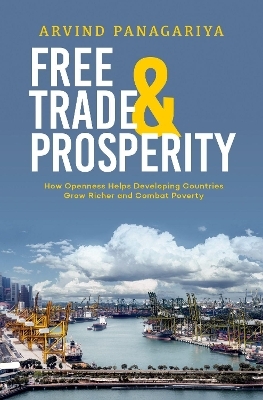
Free Trade and Prosperity
Oxford University Press Inc (Verlag)
978-0-19-091449-3 (ISBN)
Arguments for protection and against free trade have seen a revival in developed countries such as the United States and Great Britain as well as developing countries such as India. Given the clear benefits trade openness has brought everywhere, this is a surprising development. The benefits of free trade are especially great for emerging market economies.
FreeTrade and Prosperityoffers the first full-scale defense of pro-free-trade policies with developing countries at its center. Arvind Panagariya, a professor at Columbia University and former top economic advisor to the government of India, supplies a historically informed analysis of many longstanding but flawed arguments for protection. He starts with an insightful overview of the positive case for free trade, and then closely examines the various contentions of protectionists. One protectionist argument is that "infant" industries need time to grow and become competitive, and thus should be sheltered. Other arguments are that emerging markets are especially prone to coordination failures, they are in need of diversification of their production structures, and they suffer from market imperfections. The panoply of protectionist arguments, including those for import substitution industrialization, fails when subject to close logical and empirical scrutiny.
Free trade and outward-oriented policies are preconditions to both sustained rapid growth and poverty alleviation in developing countries. Panagariya provides compelling evidence demonstrating the failures of protectionism and the promise of free trade using detailed case studies of successful countries such as Singapore, Taiwan, South Korea, China and India. Low or declining barriers to free trade and high or rising shares of trade in total income have been key elements in the sustained rapid growth and poverty alleviation in these countries and many others.
Free trade is like oxygen: the benefits are ubiquitous and not noticed until they are no longer there. This important book is an essential reminder of the costs of protectionism.
Arvind Panagariya is Professor of Economics and the Jagdish Bhagwati Professor of Indian Political Economy at Columbia University. From January 2015 to August 2017, he served as the first Vice Chairman of the NITI Aayog, Government of India in the rank of a Cabinet Minister. Previously he was Chief Economist of the Asian Development Bank. He is the author of India: The Emerging Giant (2008, OUP) and his columns have appeared in the Financial Times, Wall Street Journal and India Today.
Chapter 1 - Setting the Stage
Part I - Questioning the Protectionists' Arguments
Chapter 2 - The Mirage of Infant Industry Protection
Chapter 3 - Other Common Arguments for Protection
Chapter 4 - The Positive Case for Trade Openness
Part II - Trade, Growth, Poverty and Inequality
Chapter 5 - Trade Openness and Growth: Exposing the Critics' Specious Arguments
Chapter 6 - Trade Openness and Sustained Rapid Growth: Miracles and Debacles
Chapter 7 - Trade Openness and Poverty: Exposing the Critics' Specious Arguments
Chapter 8 - Trade Openness and Poverty: The Empirical Evidence
Chapter 9 - Trade Openness and Inequality
Part III - Miracles of Yesteryear
Chapter 10 - The Uncontroversial Cases of Hong Kong and Singapore
Chapter 11 - Taiwan: An Early Triumph of Outward Orientation
Chapter 12 - South Korea: From Basket Case to Middle Income
Part IV - Miracles of Today
Chapter 13 - India: From Near Autarky to Near Free Trade
| Erscheinungsdatum | 18.04.2019 |
|---|---|
| Verlagsort | New York |
| Sprache | englisch |
| Maße | 236 x 163 mm |
| Gewicht | 635 g |
| Themenwelt | Sozialwissenschaften ► Politik / Verwaltung ► Vergleichende Politikwissenschaften |
| Wirtschaft ► Betriebswirtschaft / Management | |
| Wirtschaft ► Volkswirtschaftslehre ► Makroökonomie | |
| ISBN-10 | 0-19-091449-1 / 0190914491 |
| ISBN-13 | 978-0-19-091449-3 / 9780190914493 |
| Zustand | Neuware |
| Haben Sie eine Frage zum Produkt? |
aus dem Bereich


